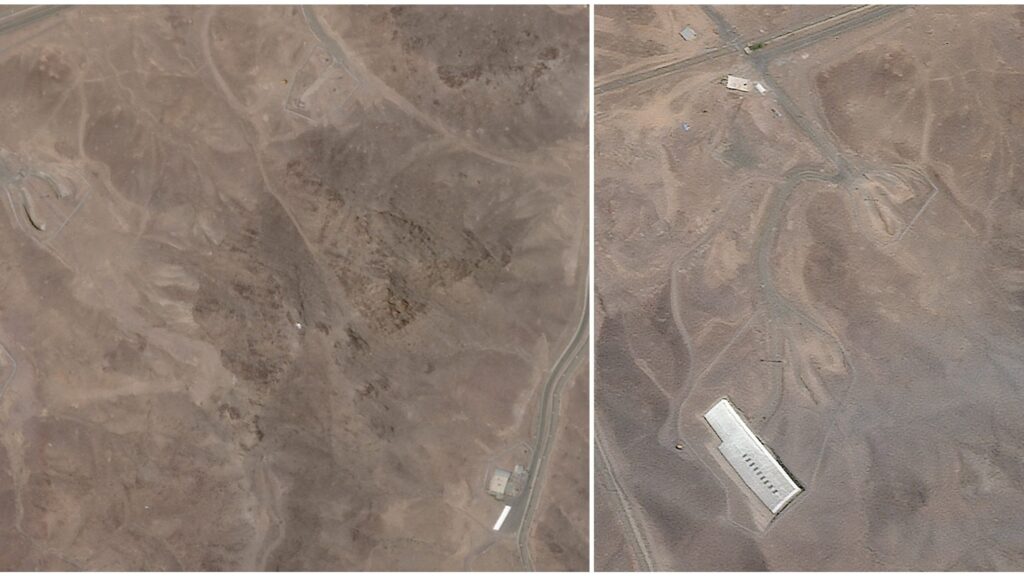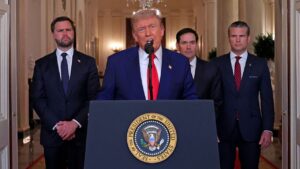
WASHINGTON, D.C. – The United States is on high alert following a series of targeted bombings on three of Iran’s nuclear sites, prompting warnings of retaliation from Tehran. The strikes, which occurred on Saturday evening, have intensified tensions in the region, with global leaders calling for restraint.
Immediate Impact of U.S. Military Action
The Pentagon confirmed that U.S. forces are prepared to respond to any Iranian counterattacks. Joint Chiefs of Staff General Dan Caine emphasized the readiness of American forces during a briefing on Sunday.
“Our forces remain on high alert and are fully postured to respond to any Iranian retaliation or proxy attacks, which would be an incredibly poor choice. We will defend ourselves. The safety of our service members and civilians remains our highest priority,” Caine stated.
Key Details Emerge from Pentagon Briefing
Defense Secretary Pete Hegseth declared the mission, dubbed Operation Midnight Hammer, a success in dismantling Iran’s nuclear capabilities. He highlighted the stealth and precision of the B-2 bombers used in the operation.
“The order we received from our commander in chief was focused, it was powerful, and it was clear. We devastated the Iranian nuclear program,” Hegseth said.
Pope Leo Calls for Diplomacy
In the wake of the military action, Pope Leo XIV urged for peace and diplomatic solutions during his weekly prayer. He emphasized the moral responsibility of the international community to prevent further escalation.
By the Numbers: Impact on Iran
- Three nuclear sites targeted: Fordow, Natanz, and Isfahan
- Strikes occurred between 6:40 p.m. and 7:10 p.m. ET
- Initial assessments indicate severe damage and destruction
Global Reactions and Calls for De-escalation
Israel praised the U.S. decision, viewing it as a necessary step to curb Iran’s nuclear ambitions. However, the United Nations and several world leaders have called for immediate de-escalation to avoid further conflict.
“There is a growing risk that this conflict could rapidly get out of control − with catastrophic consequences for civilians, the region, and the world,” U.N. Secretary General Antonio Guterres warned.
Russia and China Condemn U.S. Strikes
Both Russia and China have criticized the U.S. actions, citing violations of international law and the United Nations Charter. They have called for an end to hostilities and a return to diplomatic negotiations.
What Comes Next for Iran?
Iran’s response to the strikes remains uncertain. Foreign Minister Abbas Araghchi has indicated that Iran reserves all options to defend its sovereignty. The international community is closely monitoring the situation, with concerns over potential military escalation.
UN Watchdog to Convene Emergency Meeting
The International Atomic Energy Agency (IAEA) will hold an emergency session in Vienna to address the situation and ensure continued inspections in Iran. The agency has expressed concerns over nuclear safety and security following the strikes.
Background Context: Ongoing Tensions
The U.S. strikes are the latest development in a conflict that began with Israel’s attacks on Iranian infrastructure. The situation has been exacerbated by Iran’s intermittent internet blackouts and missile launches in response to Israeli actions.
Expert Analysis and Future Implications
Experts are divided on the long-term implications of the U.S. strikes. Some warn of increased instability in the Middle East, while others see potential for renewed diplomatic efforts. The coming days will be crucial in determining the direction of this unfolding crisis.
The story continues to develop as global leaders and organizations work towards preventing a broader conflict.







